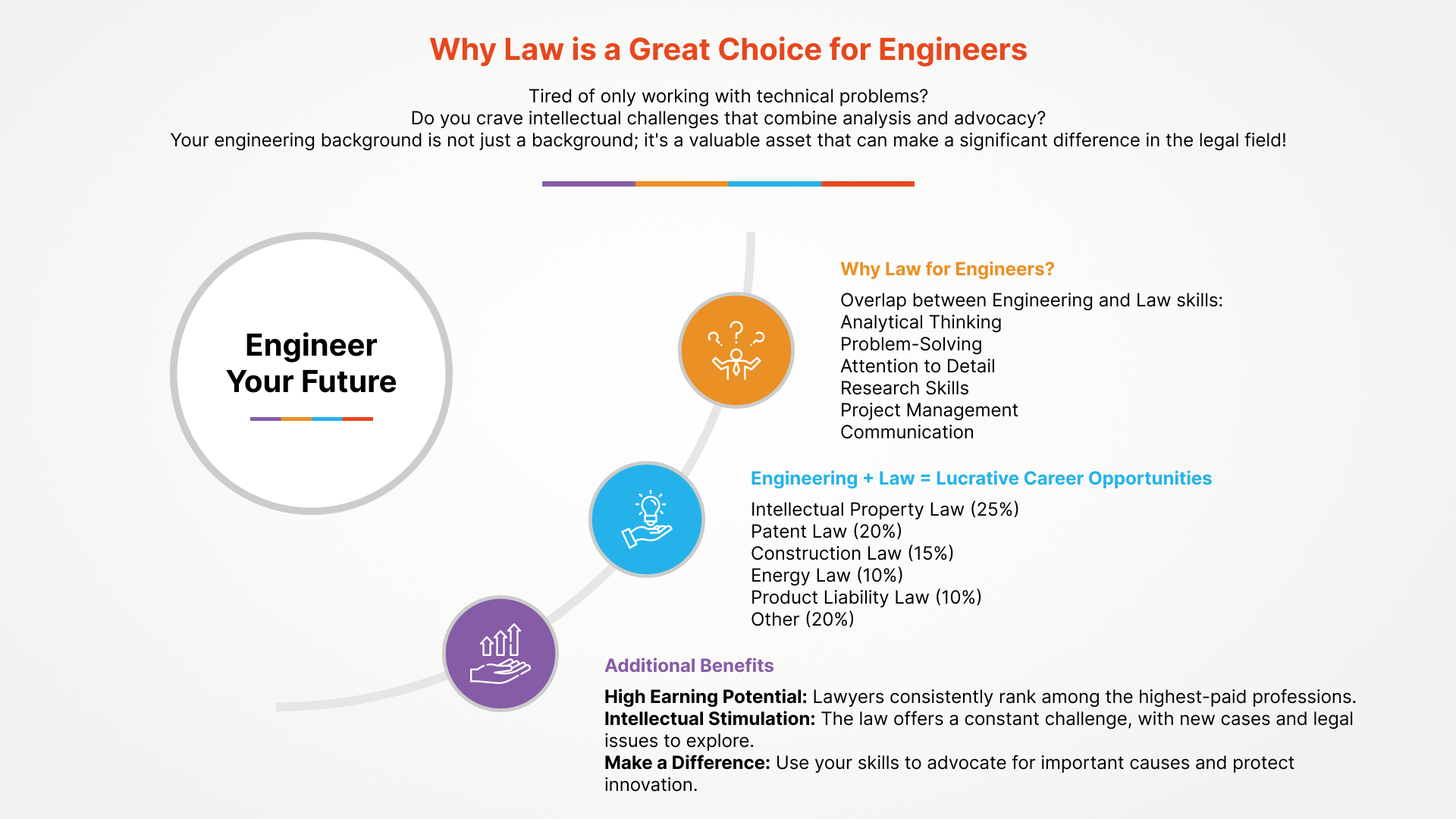LLB After Engineering: An Exciting New Path to Legal Excellence
The traditional route of engineering might not be the only path for your ambitions. LLB After Engineering is a new direction and a strategic career move that is gaining momentum. It allows you to wield the power of law while leveraging the brilliance of engineering. This blog will delve into this exciting and strategic career transition.
After your engineering degree, we'll explore the unique advantages of pursuing an LLB (Bachelor of Laws). This path not only allows you to wield the power of law but also leverages the brilliance of your engineering background. We'll also discuss the thriving legal specialisations that perfectly complement your engineering skills and the steps to embark on this journey towards legal excellence. So, buckle up, engineer-turned-lawyer, and let's unlock the potential of this dynamic career combination!

Eligibility Criteria for LLB after Engineering
So you've decided to embark on the exciting path of LLB after Engineering! Before diving into the specifics of entrance exams and colleges, let's first understand the eligibility criteria you'll need to meet. These requirements are generally quite straightforward but can vary slightly between universities. Here's a breakdown of the key factors:
Educational Qualification: This one's a no-brainer! You'll need a Bachelor's degree in Engineering (B.Tech or B.E.) from a recognised university.
Minimum Marks: Your engineering degree requires a minimum percentage. This typically falls between 40-45%, with some universities having slightly higher cut-offs for the general category. Reserved categories (SC/ST/OBC) often have a slightly lower minimum percentage requirement.
Age Limit: The good news is that there's generally no upper age limit to pursue an LLB! So, whether you're a fresh graduate or a seasoned engineer seeking a career shift, you're eligible to apply.
Popular Specialisations for LLB after Engineering
So you've got the engineering background and the drive to pursue law. But with a vast legal landscape, which specialisation should you choose? Here's where your engineering expertise becomes a superpower! Let's explore some of the most popular and rewarding specialisations for LLB graduates with an engineering background:
Cyber Law: This dynamic field deals with the legal issues arising from the digital age. Your understanding of technology and legal knowledge make you uniquely qualified to navigate areas like data privacy, cybercrime, and intellectual property in the online world.
Intellectual Property Law (IPR Law): As an engineer, you already appreciate the value of innovation. IPR law deals with protecting creations of the mind, like inventions, designs, and literary works. Your technical knowledge will be invaluable in understanding patents, copyrights, and trademarks, making you a sought-after legal professional for tech companies and inventors.
Patent Law: A sub-specialization within IPR law, patent law focuses on securing and enforcing patents that grant exclusive rights to inventions. Your engineering expertise and legal knowledge perfectly position you to analyse inventions, draft patent applications, and navigate the intricacies of patent law.
Telecom Law & Media Law: These specialisations deal with the legal frameworks governing telecommunications, broadcasting, and other forms of media. Your understanding of technology will benefit spectrum management, content regulation, and data privacy in the media and telecom sectors.
Environmental Law & Energy Law: If you're passionate about sustainability, these specialisations offer a unique blend of engineering knowledge and legal expertise. You can delve into areas like pollution control, renewable energy regulations, and environmental impact assessments for infrastructure projects.
Benefits of Pursuing LLB after Engineering
There are several benefits to consider if you're an engineer thinking about pursuing an LLB degree:
Strong Foundational Skills: Engineering programs hone your analytical and reasoning abilities, which are essential for lawyers. The LLB builds on this foundation by equipping you with in-depth knowledge of legal principles, theories, and practices. You'll gain expertise in areas like constitutional law, criminal law, contract law, and legal research.
Boosted Career Prospects: An LLB combined with your engineering background opens doors to a wider range of career options. Here are some examples:
- Patent Law: With your technical knowledge and legal expertise, you'd be well-suited to handle patent applications and litigation in areas related to your engineering discipline.
- Corporate Law: Many companies need legal advisors who understand their business's technical aspects. Your engineering background, combined with your legal knowledge, perfectly positions you for such roles.
- Emerging Fields: The intersection of law and technology is constantly evolving. Your skillset would be valuable in cyber, intellectual property, and data privacy law.
Increased Versatility: Having a law degree alongside your engineering qualification gives you greater flexibility in your career path. You could choose to work in a law firm, become a legal consultant for an engineering firm, or even start your own practice specialising in a technical field.
Well-Rounded Skillset: Law school fosters critical thinking, communication, and research skills that complement your engineering expertise. This well-rounded skillset makes you a more valuable asset to any employer.
Personal Interest: If law has always fascinated you, pursuing an LLB can be a fulfilling way to combine your interests with your engineering background.
Remember, this is a significant decision, so carefully consider your career goals, the time commitment of law school, and the additional costs involved.
Career Prospects in LLB after Engineering
An LLB after engineering opens doors to a unique and rewarding career path. Combining your technical expertise with legal knowledge creates a valuable skillset in today's job market. Here's a breakdown of the prospects:
Advantages of an LLB after Engineering:
Specialisation Opportunities: Your engineering background makes you a perfect candidate for specialisations like:
- Cyber Law: Dealing with data privacy, digital crimes, etc.
- Intellectual Property Law (IPR): Managing patents, copyrights, trademarks for tech companies, etc.
- Patent Law: Specifically focusing on the legal aspects of patents.
Broader Career Options: Besides these specialisations, you can also pursue general law fields like:
- Corporate Law: Providing legal advice and ensuring compliance for companies.
- Contract Law: Drafting and reviewing contracts for various industries.
- Litigation: Representing clients in court proceedings.
High Demand: Lawyers with a technical background are in high demand, especially by IT companies, engineering firms, and corporations dealing with technology.
Career Paths:
Law Firm Attorney: Work in a law firm specialising in areas relevant to your engineering background.
Corporate Counsel: Provide in-house legal advice to a company in your engineering field.
Patent Agent: Help clients navigate the patent application process.
Legal Consultant: Offer specialised legal advice on a contract basis.
Judge: Pursue a career in the judiciary system, leveraging your technical understanding in relevant cases.
LLB after Engineering: Popular Entrance Exams
An engineering degree followed by an LLB opens exciting career avenues in the legal field, particularly for specialisations like patent law, cyber law, and intellectual property law. You'll need to crack an entrance exam to secure admission into a good law program after engineering. Here's a breakdown of the popular options:
National Level Exams:
CLAT (Common Law Admission Test): This prestigious exam is the gateway to India's top National Law Universities (NLUs). It tests your legal aptitude, logical reasoning, reading comprehension, and critical thinking. While CLAT primarily offers admissions for integrated law programs (BA LLB, BBA LLB), some NLUs might also use CLAT scores for their LLB programs.
LSAT-India (Law School Admission Test - India): Modeled after the American LSAT, this test focuses on analytical reasoning and logical skills. LSAT scores are accepted by several prestigious law schools across India, both public and private.
University/State Level Exams:
Apart from national exams, many universities and states conduct their own entrance exams for LLB admissions. These exams might be more relevant if you target a specific law school or prefer studying within your state. Here are some examples:
BHU UET (Banaras Hindu University Entrance Test): This exam is for admission into the LLB program at Banaras Hindu University.
DU LLB Entrance Exam: Conducted by Delhi University for admission to its LLB program.
MH CET Law (Maharashtra Common Entrance Test - Law): Entrance exam for LLB admissions in Maharashtra.
TS LAWCET (Telangana Law Common Entrance Test): Entrance exam for LLB admissions in Telangana.
AP LAWCET (Andhra Pradesh Law Common Entrance Test): Entrance exam for LLB admissions in Andhra Pradesh.
In conclusion, pursuing an LLB after engineering opens a dynamic new chapter in one's professional journey. This unique combination equips you with the analytical prowess of engineering and the persuasive power of law, making you a highly sought-after professional. Armed with this versatile skill set, you can navigate the complexities of legal issues in the ever-evolving techno-social landscape.
Institutions like Chandigarh Group of Colleges, Jhanjeri, and their commitment to quality legal education provide the ideal springboard for this exciting new path. By combining a strong foundation in engineering principles with a comprehensive legal curriculum, CGC Jhanjeri empowers you to bridge the gap between these two seemingly disparate disciplines.
So, take the plunge and embark on this invigorating journey that merges the logic of engineering with the power of law. The future of legal practice belongs to those who can think critically, solve problems creatively, and navigate the intricate world of technology. With an LLB after engineering, you will be well-positioned to be a leader in this exciting new era.
Frequently Asked Questions (FAQs)
Q. Can I do an LLB after engineering?
Ans. Absolutely! LLB programs are open to graduates from any discipline, including engineering. Your BTech background can even be an advantage in certain areas of law.
Q. What are the exams for LLB after BTech?
Ans. There are two main types of LLB programs:
3-year LLB: Entrance exams like the Common Law Admission Test (CLAT) are common for these programs.
Integrated 5-year LLB: Some universities offer these programs, and they have their own entrance exams.
Q. Is LLB better than BTech?
Ans. There's no "better" option. It depends on your career goals and interests. Both degrees offer great opportunities. An LLB equips you for law-related careers, while a BTech prepares you for engineering fields.
Q. Can we do BTech LLB?
Ans. No combined BTech LLB program is typically offered. However, you can pursue an LLB after completing your BTech.
Q. Is LLB after BTech good?
Ans. Yes, LLB after BTech can be a great combination. Your engineering background gives you a unique edge in areas like patent, cyber, or intellectual property law.
Q. What is the eligibility for LLB?
Ans. The eligibility criteria for LLB programs can vary slightly, but generally, you'll need a bachelor's degree with a minimum percentage (often around 50%).
Q. How can I study LLB after BTech?
Ans. Appear for the relevant entrance exam (CLAT or university-specific). Choose a good LLB program based on factors like reputation, faculty, and placements. Focus on developing strong analytical and research skills, which are crucial for both engineering and law.


















